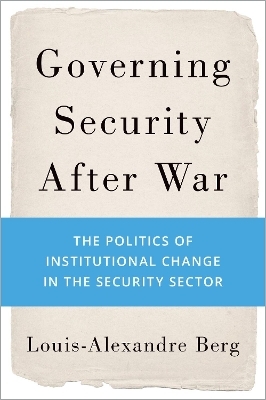
Governing Security After War
Oxford University Press Inc (Verlag)
978-0-19-757238-2 (ISBN)
In Governing Security After War, Louis-Alexandre Berg examines the political dimensions of security governance through systematic, cross-country comparison. Berg argues that the extent to which state policymakers adopt changes to the management and oversight of security forces depends on internal political dynamics, specifically the degree to which leaders need to consolidate power. The different political strategies leaders pursue, in turn, affect opportunities for external actors to influence institutional changes through means such as conditions on aid, norm diffusion, or day-to-day participation in decision-making.
Drawing on an original dataset of security governance and field research in Liberia, Bosnia and Herzegovina, and Timor-Leste, as well as mini-case studies of Iraq, Afghanistan, South Sudan, and Somalia, Berg draws out novel implications that help explain the recurrence of civil war and the impact of foreign aid on peacebuilding. Moreover, Berg provides practical recommendations for navigating the political challenges of institutional change in conflict-affected countries. Ultimately, Governing Security After War seeks to explain the success and failure of international assistance in war-torn countries and sheds light on the politics of peacebuilding.
Louis-Alexandre Berg is Assistant Professor of Political Science at Georgia State University. His research examines the causes and consequences of violent conflict and crime in developing countries, and the effects of international security assistance and peacebuilding programs. He has worked extensively on peacebuilding and security assistance programs in the field, and served as an adviser to the United Nations, the World Bank, and the U.S. Government. He holds a PhD from Georgetown University, an MA from Princeton University, and a BA from Brown University.
List of Figures
List of Tables
Acknowledgments
List of Abbreviations
Chapter 1. Introduction
Chapter 2. The Politics of Postwar Security Governance
Chapter 3. Strength in Vulnerability: Military and Police Restructuring in Liberia
Chapter 4. Politics of Fear: Police and Defense Reform in Bosnia and Herzegovina
Chapter 5. Influence of Riches: The Timor-Leste National Police
Chapter 6. Across Postwar Countries and Beyond: Statistical Analysis of Security Governance
Chapter 7. Conclusion
Appendix
Bibliography
Index
| Erscheinungsdatum | 07.02.2022 |
|---|---|
| Verlagsort | New York |
| Sprache | englisch |
| Maße | 238 x 163 mm |
| Gewicht | 626 g |
| Themenwelt | Sozialwissenschaften ► Politik / Verwaltung ► Europäische / Internationale Politik |
| ISBN-10 | 0-19-757238-3 / 0197572383 |
| ISBN-13 | 978-0-19-757238-2 / 9780197572382 |
| Zustand | Neuware |
| Haben Sie eine Frage zum Produkt? |
aus dem Bereich


